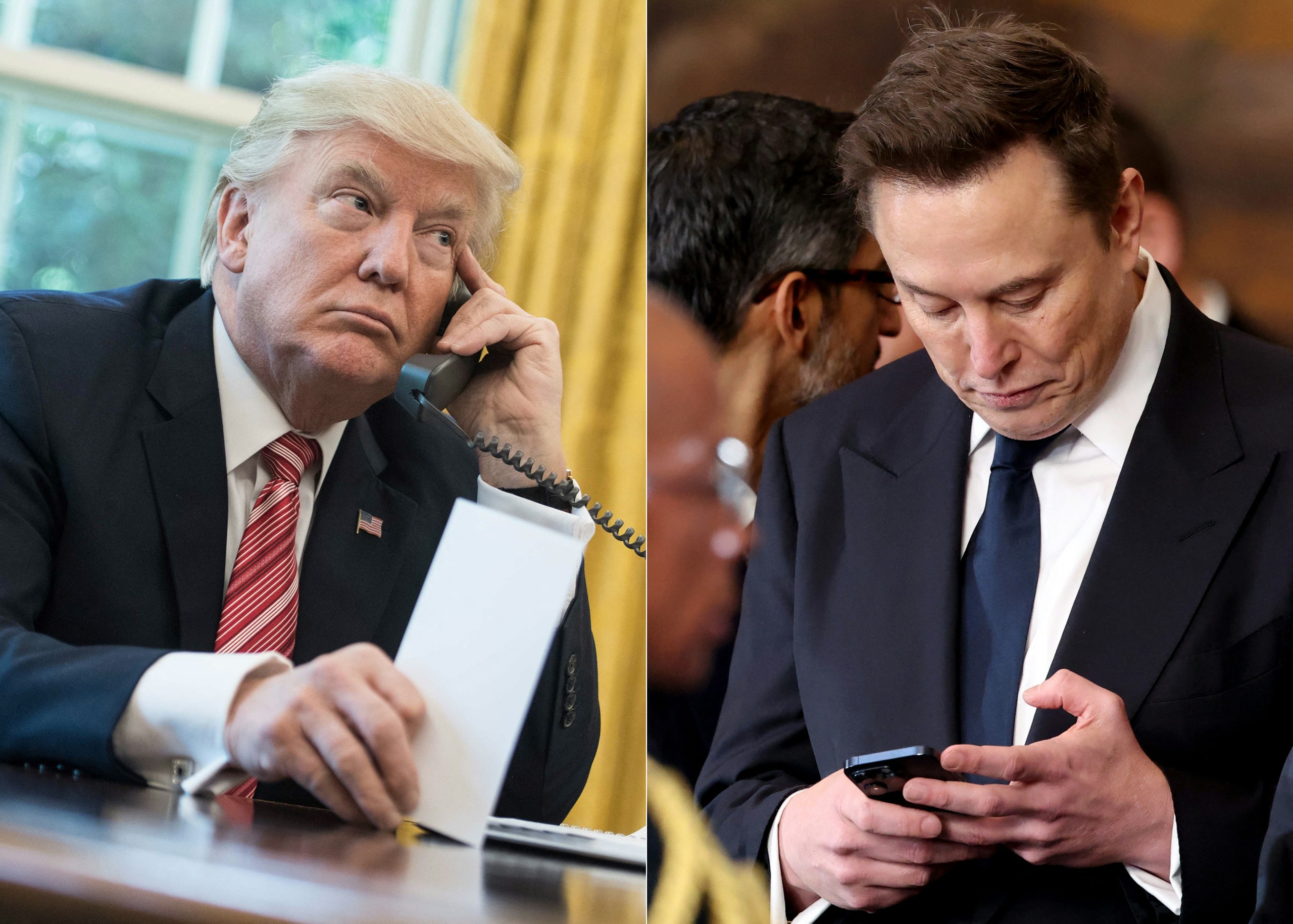In a stunning escalation of their once-close alliance, U.S. President Donald Trump has hinted at the possibility of deporting Elon Musk, the billionaire innovator behind Tesla and SpaceX, back to his native South Africa. The provocative statement, made on July 1, 2025, amid a heated feud over a controversial tax and spending bill, has sent shockwaves through political and tech circles. Musk’s unexpected reaction—marked by restraint yet laced with defiance—has left observers both amazed and intrigued. As of July 17, 2025, this dramatic showdown unfolds against a backdrop of shifting alliances, policy disagreements, and Musk’s complex immigration history. This article delves into the origins of the feud, Trump’s deportation threat, Musk’s surprising response, and the broader implications, drawing on the latest developments.
The Feud Ignites: A Clash Over Policy
The rift between Trump and Musk, once political allies during the 2024 presidential campaign, reignited in late June 2025 over Trump’s “One Big Beautiful Bill,” a sweeping tax and spending package. Musk, who spent over $270 million supporting Trump’s re-election and briefly led the Department of Government Efficiency (DOGE) until May 2025, turned critical as the bill progressed through Congress. On June 30, he took to X to denounce the legislation, calling it “utterly insane” and a “disgusting abomination” for its projected $3.3 trillion addition to the national debt over a decade. He threatened to form a new “America Party” and back primary challenges against supportive Republicans, a move that directly challenged Trump’s agenda.

Trump retaliated with a late-night Truth Social post on July 1, accusing Musk of hypocrisy. He argued that Musk, aware of his opposition to the electric vehicle (EV) mandate during the campaign, had benefited from “more subsidies than any human being in history.” Trump wrote, “Without subsidies, Elon would probably have to close up shop and head back home to South Africa. No more Rocket launches, Satellites, or Electric Car Production, and our Country would save a FORTUNE.” The comment targeted Musk’s companies—SpaceX, Tesla, and Starlink—which have received at least $38 billion in government contracts, loans, and tax credits, according to analyses. This set the stage for Trump’s subsequent deportation hint.
The Deportation Threat: A Political Gambit
During a press interaction outside the White House on July 1, as Trump departed for a visit to a Florida immigration detention facility, a reporter asked if he would deport Musk. Trump responded, “I don’t know. We’ll have to take a look,” adding with a smile, “We might have to put DOGE on Elon. DOGE is the monster that might have to go back and eat Elon. Wouldn’t that be terrible?” The remark, tying Musk’s own creation—DOGE—to a potential investigation of his subsidies, was both a personal jab and a policy threat. Later that day in Florida, Trump reiterated his stance, suggesting Musk could “lose a lot more” than the EV mandate, intensifying the feud.
Legally, deporting Musk, a naturalized U.S. citizen since 2002, is a complex proposition. U.S. law allows citizenship revocation only in rare cases, such as fraud or misrepresentation during naturalization, requiring substantial evidence. Musk, born in Pretoria, South Africa, in 1971, moved to Canada at 17 to avoid mandatory military service under apartheid and later to the U.S. on a J-1 student visa, transitioning to an H-1B work visa before citizenship. Despite claims from figures like Steve Bannon, who on his “War Room” podcast called Musk an “illegal alien” and urged immediate deportation, experts see little basis for such action without clear misconduct evidence. The threat appears more a rhetorical flourish to pressure Musk than a serious policy intent.
Musk’s Astonishing Response: Restraint with a Hint of Defiance
Musk’s reaction, posted on X shortly after Trump’s comments, stunned onlookers with its measured tone. “So tempting to escalate this. So, so tempting. But I will refrain for now,” he wrote, responding to a video of Trump’s remarks. This marked a departure from his earlier combative stance, such as his June 3 post labeling the bill a “disgusting abomination” or his June 30 “PORKY PIG PARTY” jab. The restraint surprised many, given his history of fiery exchanges, including a 2024 apology to Trump after accusing him of Epstein ties.
Musk’s response suggests a strategic pause, possibly to avoid further alienating Trump or to assess the political fallout. Earlier, he had doubled down on his anti-subsidy stance, writing, “I am literally saying CUT IT ALL. Now,” daring Trump to follow through. His decision to “refrain” may reflect awareness of his vulnerable position—both as a naturalized citizen and a major government contractor—or a desire to protect his companies amid Tesla’s 21% year-to-date stock decline and SpaceX’s $2.89 billion NASA lunar contract. The mix of temptation and restraint has left observers marveling at his calculated approach.
Public and Media Reactions: A Divided Landscape
The feud has polarized reactions. Supporters of Musk, especially on X, praised his stance against wasteful spending, with posts highlighting his consistency in advocating cuts. Critics of Trump saw the deportation threat as authoritarian overreach, with some calling it a “McCarthyist” tactic to silence dissent. Media coverage varies: USA Today framed it as a “new heights” escalation, while The Guardian warned of a chilling effect on political discourse. Hindustan Times noted Musk’s public break with Trump began in June, tying it to EV tax credit cuts costing Tesla $1.2 billion annually.
Skeptics question Musk’s motives, suggesting his opposition stems from self-interest rather than principle, given Tesla’s reliance on subsidies. Others, like POLITICO’s Brad Wilcox, argue the spat reflects Musk’s waning influence over Trump, who may be distancing himself from a former ally to appease anti-subsidy voters. The deportation talk has also revived debates about Musk’s South African roots, with some X users mocking the idea, while others see it as a distraction from policy substance.
Context: A Fractured Alliance
The Trump-Musk alliance, forged during the 2024 campaign, crumbled publicly in June 2025 over the spending bill. Musk’s DOGE role, aimed at slashing government waste, ended abruptly after he clashed with Trump over EV mandates and debt ceiling hikes. Their bromance, marked by White House Tesla showcases and Musk’s $100 million pledge for midterms, soured as Musk criticized the bill’s $5 trillion debt increase. Trump’s threat to use DOGE against Musk—once his brainchild—adds irony to the fallout.
Musk’s South African background, including his criticism of the country’s land expropriation laws and alleged “white genocide,” has long been a point of contention. His 2018 Twitter posts on the issue, echoed by Trump in 2025, strained ties with South Africa’s government, which Musk has called “racist” for its ownership policies. This history lends context to Trump’s deportation jab, though it’s unlikely to sway legal outcomes given Musk’s citizenship status.
Implications for Musk and SpaceX
The feud poses risks for Musk’s empire. Tesla’s stock dipped 6% on July 1, reflecting market unease, while SpaceX’s government contracts—vital for Starship and Starlink—could face scrutiny if DOGE investigates. Musk’s threat to form a new party might split Republican votes, weakening his political leverage. Yet, his restraint could preserve business ties, especially with NASA’s lunar plans.
For Trump, the spat tests his control over allies turned critics. Deportation threats, even if symbolic, could embolden opponents to challenge his administration’s immigration stance, already under fire for targeting figures like New York mayoral candidate Zohran Mamdani. The episode underscores the fragility of their alliance, once seen as a powerhouse of innovation and populism.
Looking Ahead
As of July 17, 2025, the feud’s next chapter hinges on congressional action on the bill and Musk’s next move. His America Party idea, while bold, faces hurdles in gaining traction, but his financial clout could sway midterms. Trump may double down on subsidies cuts to assert dominance, though legal barriers limit deportation feasibility. The public awaits Musk’s escalation—or further restraint—making this a saga to watch.
Conclusion
Donald Trump’s suggestion to deport Elon Musk to South Africa, sparked by their clash over the “One Big Beautiful Bill,” has escalated a personal and political feud into uncharted territory. Musk’s astonishingly restrained yet defiant response—“So tempting to escalate this. So, so tempting. But I will refrain for now”—has captivated audiences, blending surprise with strategic nuance. As both navigate the fallout, the incident highlights the volatile intersection of power, policy, and personality, leaving the tech world and beyond in awe of this unfolding drama.





